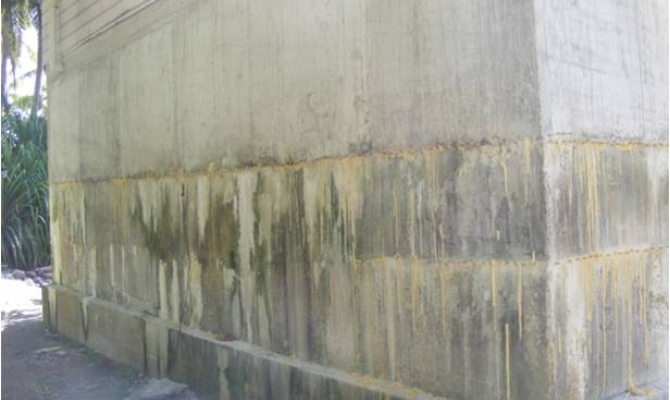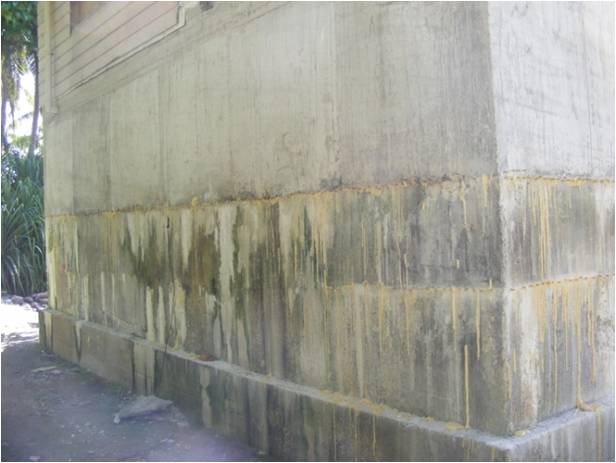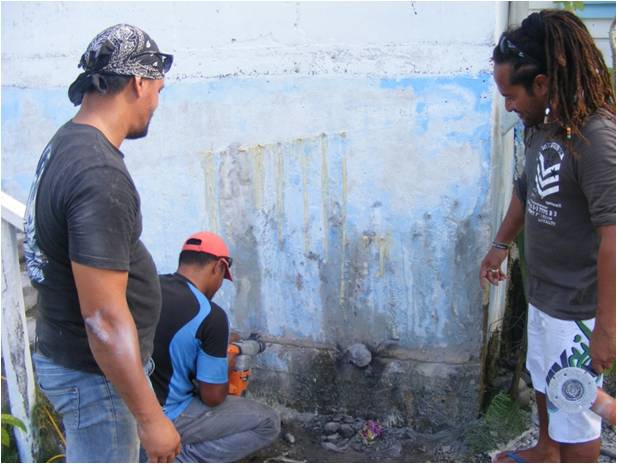
Climate Change Resilience
Tokelau has made global headlines for being the first Pacific island to generate electricity from 100% renewable energy sources. Now the island atoll is back making headlines again for another star achievement - a short film showcasing results of a climate change adaptation project in Tokelau.
Launched in Samoa, while the world deliberates at the UN Climate Convention in Peru, "Vital Health" - the seventh film in the Vital series tells the story of the PACC+ project and the improvements it has made to water supply and quality for the people of Tokelau.
The results reflect effective and genuine partnerships by the government of Tokelau, the Secretariat of the Pacific Regional Environment Programme (SPREP) as implementing agency managing the project, and the United Nations Development Programme-Global Environment Facility and Government of Australia providing technical and funding support.
Tokelau, a member of the CANCC - the Coalition of Atoll Nations on Climate Change, has an approximate population of 1,400 people that live on three atolls of combined area of about 10 square kilometres.
Their only source of freshwater is rainwater and dry periods quickly lead to shortages.
In 2011, the country faced its worst ever drought and declared a state of emergency. Drinking water was flown in and shipped to the islands to alleviate the immediate crisis, but at the same time the Pacific Adaptation to Climate Change (PACC) team began looking for a longer term solution.
“We know that with climate change this problem will only get worse,” says Tokelau PACC Project Coordinator, Jewel Toloa. “So we needed a quick solution, but one that also would keep working for the future.”

Water tank in need of repairs on Tokelau
It was clear that the country’s water harvesting systems needed an upgrade, and the project stepped up to help. All homes on all three atolls were targeted and tank repairs, replacements, new guttering, new pipes and other essential works were undertaken.
Water quality was also addressed, with a technology new to the islands. First flush diverters are a simple system that diverts the first rainfall from the roof, which usually carries contaminants, away from the water tank. Once that has washed away, clean water enters the tank.
The film launch celebrated the near-completion of this project.
Most homes have had their systems upgraded, with the rest to follow very soon. The people of Tokelau now have a much more reliable and healthy water system.
"The PACC Project in Tokelau has proved very successful and has resulted in the availability of water for people in Tokelau increasing more than 10 times and also through now having 80% of households with properly maintained gutters," says Director General of SPREP, David Sheppard.
"I think it is fair to say that Tokelau, although small in population, has a very significant impact on the Pacific, and also the global, stage. There are many examples of this leadership, including Tokelau now obtaining 100% of their energy needs from renewable energy sources and the Tokelau Fisheries Agreement, developed at the Forum Fisheries Agency Ministerial meeting in Tokelau this year, and signed in Apia by the Governments of Samoa and Tokelau over the last few days. "

This project included the repair and upgrade of water tanks as well as new water tanks has resulted in the availability of water for people in Tokelau increasing more than 10 times
Ms. Lizbeth Cullity, Resident Representative of the United Nations Development Programme (UNDP) agreed with Mr. Sheppard, that Tokelau has also played a decisive role in responding to climate change, which is a key challenge faced by Tokelau as well as other low lying atoll countries and territories in the Pacific. In fact, Tokelau is one of the five lowest countries and territories on earth and is thus in the frontline when it comes to impact of climate change and rising sea levels.
Speaking at the Apollo Cinema in Samoa where the film was launched, PACC Programme Officer, Mr. Peniamina Leavai mentioned - "movies are a very useful tool, and these short films in the Vital series really capture the essence of our work under the PACC programme. Films give people the opportunity to talk about how the project has helped them to become more resilient to climate change.”
The Tokelau project is funded by the Australian Government. The project is implemented in Tokelau by the Economic Development, Natural Resources and Environment Department. At the regional level, the PACC programme is implemented SPREP with technical and implementing support from UNDP.
The PACC programme is the largest climate change adaptation initiative in the Pacific region, with activities in 14 countries and territories. The goal of the programme is to reduce vulnerability and to increase adaptive capacity to the adverse effects of climate change in three key climate-sensitive development sectors: coastal zone management, food security and food production, and water resources management. PACC began in 2009 and is scheduled to end in December 2014.
The launch of Vital Health took place at the Apollo Cinema in Samoa on 1 December, the film can be viewed here
Launched in Samoa, while the world deliberates at the UN Climate Convention in Peru, "Vital Health" - the seventh film in the Vital series tells the story of the PACC+ project and the improvements it has made to water supply and quality for the people of Tokelau.
The results reflect effective and genuine partnerships by the government of Tokelau, the Secretariat of the Pacific Regional Environment Programme (SPREP) as implementing agency managing the project, and the United Nations Development Programme-Global Environment Facility and Government of Australia providing technical and funding support.
Tokelau, a member of the CANCC - the Coalition of Atoll Nations on Climate Change, has an approximate population of 1,400 people that live on three atolls of combined area of about 10 square kilometres.
Their only source of freshwater is rainwater and dry periods quickly lead to shortages.
In 2011, the country faced its worst ever drought and declared a state of emergency. Drinking water was flown in and shipped to the islands to alleviate the immediate crisis, but at the same time the Pacific Adaptation to Climate Change (PACC) team began looking for a longer term solution.
“We know that with climate change this problem will only get worse,” says Tokelau PACC Project Coordinator, Jewel Toloa. “So we needed a quick solution, but one that also would keep working for the future.”

Water tank in need of repairs on Tokelau
It was clear that the country’s water harvesting systems needed an upgrade, and the project stepped up to help. All homes on all three atolls were targeted and tank repairs, replacements, new guttering, new pipes and other essential works were undertaken.
Water quality was also addressed, with a technology new to the islands. First flush diverters are a simple system that diverts the first rainfall from the roof, which usually carries contaminants, away from the water tank. Once that has washed away, clean water enters the tank.
The film launch celebrated the near-completion of this project.
Most homes have had their systems upgraded, with the rest to follow very soon. The people of Tokelau now have a much more reliable and healthy water system.
"The PACC Project in Tokelau has proved very successful and has resulted in the availability of water for people in Tokelau increasing more than 10 times and also through now having 80% of households with properly maintained gutters," says Director General of SPREP, David Sheppard.
"I think it is fair to say that Tokelau, although small in population, has a very significant impact on the Pacific, and also the global, stage. There are many examples of this leadership, including Tokelau now obtaining 100% of their energy needs from renewable energy sources and the Tokelau Fisheries Agreement, developed at the Forum Fisheries Agency Ministerial meeting in Tokelau this year, and signed in Apia by the Governments of Samoa and Tokelau over the last few days. "

This project included the repair and upgrade of water tanks as well as new water tanks has resulted in the availability of water for people in Tokelau increasing more than 10 times
Ms. Lizbeth Cullity, Resident Representative of the United Nations Development Programme (UNDP) agreed with Mr. Sheppard, that Tokelau has also played a decisive role in responding to climate change, which is a key challenge faced by Tokelau as well as other low lying atoll countries and territories in the Pacific. In fact, Tokelau is one of the five lowest countries and territories on earth and is thus in the frontline when it comes to impact of climate change and rising sea levels.
Speaking at the Apollo Cinema in Samoa where the film was launched, PACC Programme Officer, Mr. Peniamina Leavai mentioned - "movies are a very useful tool, and these short films in the Vital series really capture the essence of our work under the PACC programme. Films give people the opportunity to talk about how the project has helped them to become more resilient to climate change.”
The Tokelau project is funded by the Australian Government. The project is implemented in Tokelau by the Economic Development, Natural Resources and Environment Department. At the regional level, the PACC programme is implemented SPREP with technical and implementing support from UNDP.
The PACC programme is the largest climate change adaptation initiative in the Pacific region, with activities in 14 countries and territories. The goal of the programme is to reduce vulnerability and to increase adaptive capacity to the adverse effects of climate change in three key climate-sensitive development sectors: coastal zone management, food security and food production, and water resources management. PACC began in 2009 and is scheduled to end in December 2014.
The launch of Vital Health took place at the Apollo Cinema in Samoa on 1 December, the film can be viewed here